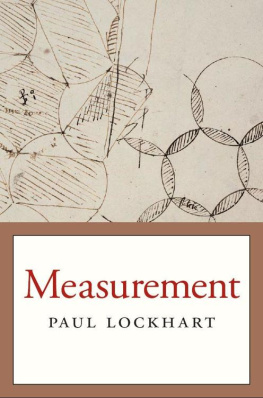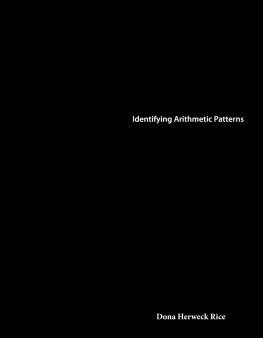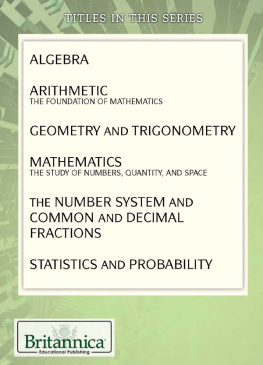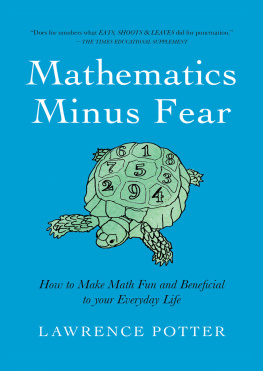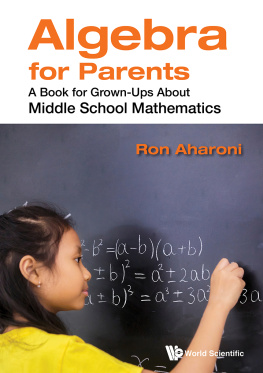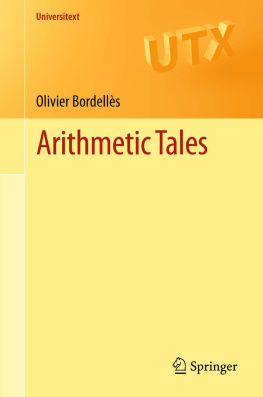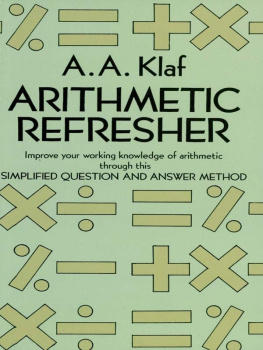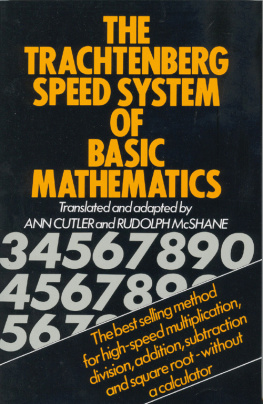ARITHMETIC
ARITHMETIC
Paul Lockhart
The Belknap Press of
Harvard University Press
Cambridge, Massachusetts
London, England
Copyright 2017 by the President and Fellows of Harvard College
All rights reserved
Printed in the United States of America
First Harvard University Press paperback edition, 2019
First printing
Library of Congress Cataloging-in-Publication Data
Names: Lockhart, Paul, author.
Title: Arithmetic / Paul Lockhart.
Description: Cambridge, Massachusetts : Harvard University Press, 2017. | Includes index.
Identifiers: LCCN 2016055136 | ISBN 9780674972230 (cloth : alk. paper) | ISBN 9780674237513 (pbk.)
Subjects: LCSH: Arithmetic. | Arithmetic--History.
Classification: LCC QA115 .L713 2017 | DDC 513--dc23 LC record available at https://lccn.loc.gov/2016055136
CONTENTS
Dear Reader,
Its fun to count and arrange things. We like doing it, and we have even developed it into something of a folk art. This art is called arithmetic. Arithmetic is the skillful arrangement of numerical information for ease of communication and comparison. It is a fun and enjoyable activity of the mind and a relaxing and amusing pastimea kind of symbol knitting, if you will. But please understand thats all it is. Being good at it doesnt make you particularly smart or mathematically inclined or anything like that. Similarly, being unskilled at arithmetic does not mean that you are stupid or that you do not have a mathematical mind. Arithmetic is just like any other craft; you can get good at it if you want to, but it is no big deal either way. My hope is that by reading this book you will be inspired to try it out for yourself and to experience firsthand the simple pleasure and satisfaction that comes with numerical fluency. Have fun!
THINGS
We find ourselves in a world full of things: plants and animals, rocks and trees, the stars in the sky and the sand on the beach. We are surrounded by multitudes. And we count them. Why exactly do we bother counting things? The truth is, we usually dont. Most situations do not really call for any careful counting, just a sense that we have plenty enough or were way short. The main reason why we count is to compare. Usually these comparisons are easy to make: So these together are about sixteen bucks... Oh, I have a twenty. No problem. In fact, most transactions these days sound less like sixteen seventy-one out of twenty, thats three twenty-nine. Have a nice day, and more like Beep. Boop. Swipe. Most of the time we dont need to do much actual counting. Still, there are times when we do want an accurate idea of exactly how many what-have-yous we happen to have. What sorts of things do we keep track of, and why?
One of the oldest is time. We can imagine meetings between prehistoric tribes being scheduled for so-many moons hence, or scratches carved in a tree counting the days the hunting party has been away. We certainly do keep track of timetoo much, if you ask me. Money, of course, is another one. People definitely keep careful track of that stuff (dont get me started). Property also: Are all of my marbles here in my marble bag? I hope we have enough silverware. Land, grain, cattle, the inventories of the ages. Seven years of famine, seven of plenty. Boy, do we like to count!
Then there is curiosity countingcounting for the sake of pure wonder. How many stars are in the Milky Way? For how many seconds can I hold my breath? Or the more mathematical: How many ways can I arrange the books on my bookshelf?
Whatever the purpose or rationale, we occasionally find ourselves wanting to know how many of something there are. This is where arithmetic begins, with desire. Theres no point counting something you dont care about. Dont ever do that. Its boring, and it will make you hate counting. There are actually a lot of people who hate arithmetic (far too many to count!), and it makes me sad. Usually its because they were made to do something they werent interested in doing. Lets not have that be you.
The point is that there are things, and we sometimes want to count them. Actually, there are some quantities that we dont so much count as measure. What we do when we measure somethingand this could be an amount of milk, or someones height, or a piece of landis we take some agreed-upon amount, known as a unit (e.g., a cup, an inch, or an acre), and we count the number of those. This has the effect of turning something smooth and continuous into something discrete and lumpy. So lets confine ourselves to thinking about counting distinct individual items.
As I said before, counting is really all about comparison. Even when you count something out of curiositysay you happen to have thirty-two penniesthe only sense in which you know how many you have is by comparison with certain other amounts (e.g., thirty), which have special names in your language and serve as familiar benchmarks of size. Just saying the word thirty-two means you have unconsciously performed a comparison: you have a little more than three double handfuls.
Comparison is always the issue. Do we have enough? Is that all going to fit? There were more of them before. Whered they all go? We count so that we can compare amounts. Now, it would be great if we could just look at two collections and know which one was bigger, as though we had a number sense akin to smell or taste. Maybe there are creatures like that who can just tell. Occasionally, some humans come along (usually severely neurologically impaired ones) who can do essentially that, but most of us are pretty bad at it. I think pretty much everyone can perceive threenessknowing that there are three things without having to literally count thembut past about six or seven it starts to get a little dicey.
Try out your ability to directly perceive quantity.
I wonder if we can get better at it with practice?
One problem is that we are a little too good at pattern recognition. Our brains are quite good at storing patterned information; we dont do so well with random spatters. Here are two examples of sixness:

I cant really say that Ive got sixness perception. I had to count the first collection. But the second one was immediate. Weve all seen that arrangement a million times. Dice players dont need to count the pips. We know those shapes like the backs of our hands. Better, in fact.
So it helps if the things we want to count are somewhat organized. Nobody wants to count a bunch of random objects strewn all around the room. For one thing, the act of counting strongly relies on memory and time sense: Which ones have I already counted? Everyone who has ever lived knows the sickening feeling of losing countforgetting where you were and having to start over. This may in fact be the single most common shared experience of humanity. We are all, under the skin, people who have at one time or another lost count. This is especially easy to do if you cant remember which things you have already counted because they all look the same and are scattered about topsy-turvy and higgledy-piggledy.
Not that we dont lose count anyway, even when things are nicely organized. The truth is that were just not very good at boring, repetitive activities. Such things simply dont hold our attention, and our minds tend to wander. Were just too darn smart and interesting, I guess.
OK, so we dont have instant number perception past five or so, and we have trouble with chaos and disorder. Also, we are careless daydreamers who cant be trusted to perform one simple mind-numbing and repetitive task. So what do we do? We come up with art and science, thats what. We develop a creative and entertaining craft of counting well, using our pattern-seeking minds.
Next page

